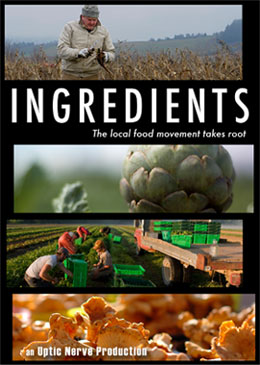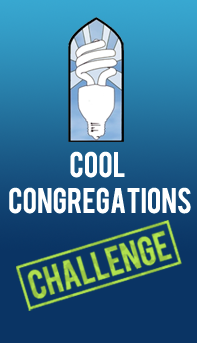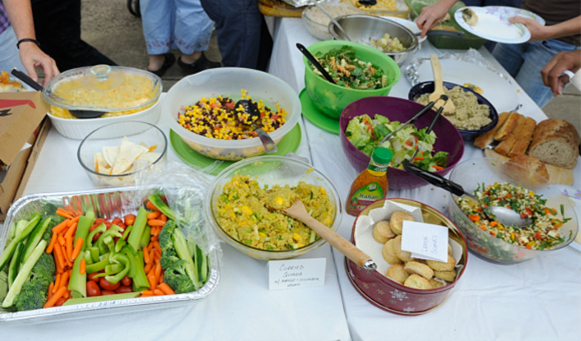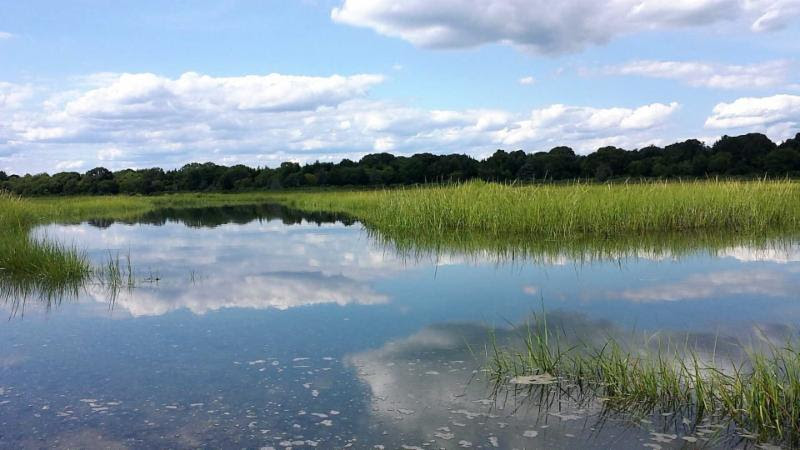| Check us out online at: |
|
  |
10/11/17 RI IPL joined Environment America and many other environmental organizations in a sign-on letter to
Support 100% by 2050 Act (
HR3314 and
S987)
Summary: The sign-on letter supports Senate and House companion bills that mandate a rapid transition to renewable energy. The companion bills establish a goal of moving the nation off fossil fuels by no later than 2050 by 1) Greening the grid, 2) electrifying heat and transportation, and 3) expanding access to clean energy to low income, minority, and disadvantaged communities.
|
Film of the Month
At RI IPL, we are always adding new films to our Film Lending Library. All of our films are available for member congregations to borrow. Many of them come with discussion notes as well. In order to showcase the films we have available, we're adding a Featured Film of the Month column to our newsletter.
You can easily bring a movie to your congregation, too. Just contact Kristen Ivy at

American food is in a state of crisis, but a movement to put good food back on the table is emerging. What began 30 years ago with chefs demanding better flavor, has inspired consumers to seek relationships with nearby farmers. This is local food.
At the focal point of this movement, and of this film, are the farmers and chefs who are creating a truly sustainable food system. Their collaborative work has resulted in great tasting food and an explosion of consumer awareness about the benefits of eating local.
Attention being paid to the local food movement comes at a time when the failings of our current industrialized food system are becoming all too clear. For the first time in history, our children's generation is expected to have a shorter lifespan than our own. The quality, taste and nutritional value of the food we eat has dropped sharply over the last fifty years. Shipped from ever-greater distances, we have literally lost sight of where our food comes from and in the process we've lost a vital connection to our local community and to our health.
A feature-length documentary, INGREDIENTS illustrates how people around the country are working to revitalize that connection. Narrated by Bebe Neuwirth, the film takes us across the U.S. from the diversified farms of the Hudson River and Willamette Valleys to the urban food deserts of Harlem and to the kitchens of celebrated chefs Alice Waters, Peter Hoffman, and Greg Higgins. INGREDIENTS is a journey that reveals the people behind the movement to bring good food back to the table and health back to our communities.
|
|
BOARD of DIRECTORS
The Rev. Dr. Anita Schell
Emmanuel Newport
Newport
Ray Frackelton, PhD
Newman Congregational
Rumford
Marty Davey
St. Gregory the Great
Warwick
Christine Muller
Baha
'
i Community
Kingston
Christine Cassels
St. Luke's
East Greenwich
Sarah Atkins
Emmanuel Newport
Newport
The Rev. David Helfer
Unitarian Universalist
Congregation of
South County
Peace Dale
Steve MacAusland
STAFF
Kristen Ivy Moses
Executive Director
First Unitarian Church
Providence
|
|
|
How will we save the planet?
Only by awakening to who we are.
And how will we act when we awaken to who we are?
|
|
Thank you to everyone who attended our
10th Annual Interfaith Conference on Climate Change:
Transforming Prayers into Passionate Action, f
eaturing Tim DeChristopher last month. Thanks to your support, it was our most successful conference yet.
We hope you were inspired to take bold climate action.
If you missed the conference, we will post the recording on our website soon. A special message from Senator Whitehouse is below.
|
|
Blessings,
Kristen Ivy Moses
Executive Director
Rhode Island Interfaith Power & Light
|
|
Message from Senator Whitehouse
fr
om our 10th Annual Interfaith Conference on Climate Change: Transforming Prayers into Passionate Action
|
What it means to be a member
of Rhode Island Interfaith Power and Light
RI IPL membership involves more than just reading our newsletter and attending our events. Here are 5 simple steps to being an active RI IPL member:
-
Give
a portion of your financial resources to RI IPL for our vital work. You may give online here, or by check.
|
Annual Membership Dues
|
|
Student/limited
income
$30
Regular Membership $50
Sustaining Membership $100
Sponsoring Membership $150-249
Circle of Friends $250-$999
Lifetime Membership $1000+
|
-
Pledge Take the RI IPL Membership Pledge to increase your awareness of global climate change. You can download your pledge form here.
- Be Aware Stay current with information about the science of climate change and the human role in such change, as it evolves.
- Speak Out Support and advocate for public policies that further these goals and communicate with local, state, and national elected representatives
- Take Action Follow through with one or more of the ideas from our pledge sheet. Challenge yourself!
Your support allows us to continue our crucial work. To learn more about the benefits you receive with RI IPL membership click here.
|
How Then Shall We Live?
Rev. Anita Schell, RI IPL Board President
The world is a fragile place. It has always
been so. How can we as spiritual and religious beings make the world less fragile, particularly for those for whom fragility is a way of life?
In his 1967 seminal article, "The Historical Roots of Our Ecological Crisis", medieval scholar Lynn White criticizes Western Christianity for promoting human dominance over nature and, hence, contributing to the environmental crisis. White commends Buddhism for its holistic, egalitarian worldview, but doubts that its teaching of the harmonious relationship between human beings and all creation is viable in Western society. I disagree. I believe that we can change our way of both thinking and knowing, changes that require our greatest courage and sacrifice.
The "Great Turning" is a name coined by Buddhist Joanna Macy for the shift away from the Western economic system dependent on accelerating growth. This Western political economy has set its goals and measured its performance in terms of increasing corporate profits. A Western capitalist model plays into a patriarchal epistemology that is destructive, for it views nature as having only instrumental value given by human domination. To the contrary, nature has incredible inherent worth. Such a way of knowing based on mutuality is just what is needed in ascribing an intrinsic rather than an instrumental value to nature while acknowledging that an environmental ethic depends on understanding that we as human beings are inextricably linked to nature.
As the economic downturn of late 2008 revealed, a corporate profit model, particularly one that has gone largely unchecked and unregulated, is neither sustainable nor moral. This corporate model encouraged waste and degradation of the limited resources of the earth and further destabilization of developing countries and struggling local communities. We can be part of a new model, or we can continue to contribute to further destruction of life systems. The choice is before us: to care for the Earth or to participate in the destruction of ourselves and the diversity of life.
In 2000, Paul Crutzen, a Nobel Prize-winning atmospheric chemist, announced that our epoch should no longer be called the Holocene. Our epoch should be termed the Anthropocene, the human epoch, based
on overwhelming global evidence that
atmospheric, geologic, hydrologic, biospheric, and other earth system processes are now altered by humans. In short, human activity, has caused widespread alteration of the world's land, ocean, and atmospheric systems. In the Anthropocene epoch, human power is now the primary, determining influence shaping the earth's future.
We are losing time as the earth heats up. Ready resolve is critical in educating and planning for a future where we might see life forms flourishing. In the years since the first publication of the Earth Charter, an
international declaration of fundamental values promulgating a just, sustainable, and peaceful global community,
the world has witnessed a dramatic and unprecedented change to its climate. Climate change is here, more costly to all life forms than previously documented or imagined and most detrimental to those living at and below poverty levels. This crisis demands humanity's greatest endeavors as we ask: What do you want your climate to look like over the next decades and century and what are you willing to do about it?
In The Great Derangement: Climate Change and the Unthinkable, Amitav Ghosh identifies multiple developments that have contributed to our deranged condition, including the modern conception of freedom. My experience has been that my freedom as an American can all too often become associated with personal self-discovery and consumerism in place of shared values and community-based decision making.
At the end of The Great Derangement, Ghosh offers a conclusion that did not surprise me. Ghosh states that the best hope for unscrambling the derangement of our world may be found in the growing involvement of religious leaders in addressing climate change. Ghosh claims that political, economic and financial institutions are ultimately powerless. They don't have the moral depth or the practical forms in place to accomplish much. Religions transcend nations and generations. They have a moral and spiritual depth and longevity that can constructively critique and skillfully redirect ways of thinking and being. In short, religious institutions and spiritual practices make us better individuals and citizens in our communities.
When people experience how their lives and local communities are changing before their eyes they are often moved to think and act differently from "theway we have always done it." What we do and say at the local and state level can have a profound effect at a national level, from the laws we pass to the prayers we offer. Some actions are more easily measured than others, i.e., the measuring of national carbon emissions by certain dates and by certain percentages, are being translated at the personal level into programs designed to decrease one's ecological footprint.[1] If climate change were the only factor being measured for Americans following the principles of the Earth Charter, then we as students of the Charter would be receiving failing grades for the ecocide occurring on our watch. Ecocide, the destruction of our ecosystem by human activity, including warfare, raises the deepest ethical concerns about living in the world.
How then shall we live? What can our faith communities be doing together to create new models for living with critical attention to the fragility of the earth and the resources we have squandered from it? We at RI Interfaith Power & Light are here to offer unceasing prayers, sacred texts, liturgical and spiritual resources, practical tools, ongoing support, creative ideas and new technology to address climate change, one religious practice at a time. Call us! Join us! Be with us in community. We need your help in making the world a better place for all, especially for those for whom fragility is a way of life.
[1]
A carbon footprint is the total set of GHG (greenhouse gas) emissions caused directly and indirectly by an individual, community or organization. There are many online tools to measure one's carbon footprint, ie:
www.nature.org/initiatives/climatechange/calculator
www.carbonCounter.org.
|
|
Cool Congregations Challenge

The Cool Congregations Challenge is a contest hosted by Interfaith Power & Light that awards prizes to congregations that are becoming energy efficient and sustainable role models in response to climate change. Projects of any size completed during the year December 31, 2016 to December 15, 2017 qualify.
Congregations are eligible if they finished an energy efficiency, renewable energy, or grounds and water conservation project this year, or have engaged with the community in response to global warming. There is also a planning category for those that have recently finished an energy audit and developed plans for improvements. Cash prizes of $1,000 will go to the winning contestants in each category. All winners will receive a frameable certificate. The deadline for entries is December 15, 2017.
|
Host a Cool Harvest Potluck this fall

Holding a Cool Harvest Potluck is the perfect fit for faith communities that love food, and are also concerned about global warming.
RI IPL can help you plan and host your own Cool Harvest Potluck for friends, green team members, or for your entire congregation.
It's fun, it's easy, and it's a great way to address climate change. We can help you plan, publicize, and even recommend an appropriate movie to show afterwards. Contact
Kristen Ivy
to learn more. Bon appétit!
|
|
Renewable Energy: Progress and Power in RI
2018 Plugged into URI Energy Research lecture
Join URI for a behind-the-scenes look at the first year of operations of the Block Island wind farm, an update on state-level renewable energy policies and incentives available to business and home-owners, and a discussion around cutting-edge battery storage research here at URI. Students, members of the general public, energy professionals, and renewable energy enthusiasts are welcome!
The Path Forward: Offshore Wind Energy Reliability for Rhode Island
Meeting Rhode Island's
strategic goal of 1,000 megawatts of clean energy projects by the end of 2020 will depend on a range of clean energy resources, including offshore wind. Join URI research faculty, energy policymakers, and leading offshore wind developers for a discussion about how clean energy policy development in RI is driving technological innovation and project development!
John O'Keeffe '16
Manager of Operations, Maintenance and Marine Affairs DeepWater Wind
With America's first offshore wind farm off southern coast of Block Island installed and running, DeepWater Wind's John O'Keefe will provide a behind-the-scenes look at the past year of operations and maintenance of the five deep-water turbines.
Chris Kearns '08
Legislative Liaison | Rhode Island Office of Energy Resources
Chris will share his perspective on and experience with the development of a state-level strategy for renewable energy deployment in Rhode Island, including offshore wind and onshore wind and solar options for residences and businesses.
Dr. Brett Lucht
Professor | URI Department of Chemistry
Dr. Lucht will share some of his award-winning research on lithium ion battery life and storage capabilities, and provide some insight related to how large scale electrochemical energy storage is criticalfor the integration of more renewable energy into our power grid.
Panel Discussion
Audience members will have the opportunity to ask questions of the speakers following the presentations. Bring your questions and join in on the discussion!
Wednesday, November 1st
6:00 PM to 8:00 PM
URI
Pharmacy- Paramaz Avedisian '54 Hall, Room 170
7 Greenhouse Road
Kingston, RI
|
Bringing Active Transportation
GrowSmartRI
This workshop will use the examples of two different Rhode Island municipalities -- Newport and Woonsocket -- to review steps taken and planned future actions to encourage active transportation in their communities. "Active transportation" refers to any form of human-powered transportation; e.g., walking using a wheelchair, bicycling, or skating, and addresses all physical abilities and ages. Community leaders from each municipality will discuss opportunities and barriers to accomplishing their goals. The workshop will include audience participation in taking next steps back to their communities, including engaging the public.
Presenters include:
Eric Weis, Cogent Services; Bari Freeman, Bike Newport; Jessica Walsh, Women's Resource Center; Rui Almeidea, City of Woonsocket; and Ckarla Agudelo, Thundermist Health Center.
|
|
Community Energy Choice Aggregation Explained
People's Power & Light
This past legislative session produced a new law enabling town and cities to help residents and businesses save money on their electric bills while increasing renewable energy content.
Tuesday, November 14th
10:00 AM
In-person Workshop
Thursday, November 16th
10:00 AM
National Grid Energy Innovation Hub
at the Rhode Island Convention Center
1 Sabin St
Providence, RI
Topics covered will include:
- What is community energy choice (a.k.a. municipal aggregation) and what options are available to residents and businesses
- What legislative changes were recently made that could enable aggregation your community
- What is green municipal aggregation
- How municipal aggregation is working in Massachusetts and why now is a good time for Rhode Island communities
- Why aggregation is an effective tool to increase renewable energy content effectively and affordably
- How can you support aggregation in your own municipality
Length: 45 minutes, opportunity for Q&A
We hope you will be able to participate in our webinar and/or workshop.
|
|
Religion and Ecology Workshop: Integrating Ecology and Justice
The Forum on Religion and Ecology at Yale
The call to bring together concerns for environmental degradation and the attendant human suffering has been growing over many years. This came to even fuller expression with Pope Francis' encyclical, Laudato Si: On Care for Our Common Home (Our Sunday Visitor, 2015). There he called for an "integral ecology" bringing together people and the planet. This workshop will highlight some key issues of integral ecology such as water, air, soil, food, as well as the role of women and building sustainable communities. Environmental justice issues will be explored through the lens of both principles and practice. Contemporary North American movements, such as Standing Rock and Black Lives Matter, will be discussed along with analogous movements in Asia and Latin America.
Mary Evelyn Tucker, Yale University, Presiding
John A. Grim, Yale University, Presiding
Panelists:
Willie J. Jennings, Yale University
Jace Weaver, University of Georgia
Heup Young Kim, Korea Forum for Life and Science
Cynthia Moe-Lobeda, Pacific Lutheran Theological Seminary, Graduate Theological Union
Erin Lothes Biviano, College of St. Elizabeth
Grove Harris, Temple of Understanding
Heather Eaton, Saint Paul University
Frederique Apffel-Marglin, Smith College, emerita
Friday, November 17th
Forum on Religion and Ecology Luncheon
11:45 AM to 1:45 PM
Hynes Convention Center, Room 200
900 Boylston St.
Boston, MA
Religion and Ecology Workshop: Integrating Ecology and Justice
2:30 PM-5:30 PM
Hynes Convention Center, Room 311
900 Boylston St.
Boston, MA
|
|
Water Words that Work
A workshop with communication expert Eric Eckl
Make a splash with your words and pictures! Relearn the language that everyday citizens use and become more confident and successful with your outreach. This course provides unique insights into what words and pictures turn your audience on, and off.

Part 1: The perils of preaching to the choir. You will discover how to spot the signs of "preaching to the choir" and recognize when you are sending messages that miss the mark or antagonize your audience.
Part 2. The Environmental Message Method, Steps 1-4. You will learn a proven step-by-step method to translate professional-caliber information into messages for the general public.
Part 3. The Environmental Message Method, Steps 5 and 6. You will discover techniques for getting others to vouch for you, and you will learn how to scientifically measure how easy or difficult your writing is to read.
Audiences: scientists, public officials, natural resources professionals, environmental educators, and anyone else interested in communicating environmental messages more effectively.
Cost: Thanks to NOAA funding, we're able to offer this workshop for the very low price of $25! Lunch is included.
Tuesday, December 5th
9:30 AM - 4:00 PM
RIDEM
Register Here Seats are limited. Registration deadline is November 28, 2017.
|
|
2nd RI Nature Video Festival
Call for Submissions
Rhode Island
has an abundance of nature, even in the city, and these days many people carry a camera capable of taking video. We are gathering RI Nature videos, RI Nature Video makers, and everyone who appreciates them for a fun, entertaining, and informative winter's afternoon showing and discussion/reception. The first RI Nature Video Festival was in 2016 and it was a great event. This one will be too. So here is a call for submissions to the Rhode Island Nature Video Festival being organized by the Environment Council of Rhode Island, Save The Bay, Friends of the Moshassuck, The Rhode Island Natural History Survey, and YOU. Volunteers and sponsors welcome. Email me if you want more information.
The entry rules are below, send us your links. Submission deadline is December 10, 2017, for an event that will be held on February 10, 2018 at Save the Bay. This year the festival will be FREE ADMISSION.
Links for videos being submitted should be sent to [email protected] If you want to sponsor, or volunteer, or have any questions email ECRI or if you prefer you may call the Environment Council office at 401-621-8048.
Greg Gerritt for ECRI Youtube: Moshassuckcritters
RI Nature Video Festival Submission Guidelines
The video must be filmed in RI by a human being or a group of human beings currently residing in or going to school in Rhode Island. The video must be
about
some sort of nature in Rhode Island. Animal, vegetable, mineral, trail, water but it must at least focused on a natural or naturalized set of plants or animals, or natural features. This means no dogs, cats, pet fish, pet birds, or farm animals. Sorry. Turtles, snakes, and amphibians should be native species that are free ranging or bound for
release
like tadpoles in your kiddie pool. No illegally kept or exotics will be included in the festival. Incidental inclusion of domestic animals is okay, as are farms and gardens. Videos showing the science of soil or the wild critters and plants in the garden would be eligible.
Videos shall be submitted by emailing a link to a video that is online.
Send the links to [email protected] Submitting a video is explicit permission for ECRI to use it in the event and to post the link online. The organizers of the Video Festival shall have sole discretion as to which videos are eligible. All eligible videos submitted will be included in the online video festival website. The organizers shall designate a small team to curate the Save the Bay event at which approximately 20 videos shall be shown chosen from among the submissions.
There are many different styles of video that can show RI Nature. We encourage submissions of all types from a simple recording of an animal in action to a narrated and
edited
piece showing the year at a pond and everything in between. We are restricting the submissions to videos created since the last Nature Video Festival submission deadline, so created since Jan 1, 2016. We want your new stuff.
Based on submissions the committee will create categories, partly to guide the order of presentation at the festival and partly to make sure that we show the diversity of the community and nature in Rhode Island. Places will be reserved for children under twelve, teens, students.
The maximum acceptable length of the submitted videos is 5 minutes, so that we can show videos by as many people as possible. Video makers can submit up to 5 videos. Quality, not quantity, is recommended for the experienced, but beginners are encouraged to submit, as often the nature being recorded more than compensates for the quality of the video. We highly encourage folks to go outside a make to make new video just for the show.
Any video, other than an unedited scene in nature, longer than 45 seconds, must include credits and videos with copyright violations shall be rejected. (Where did you get that music?)
All submissions must come as an email with a link to the video and accompanied by Name(s) of those who created the video with full contact information: address, phone, email, age category (12 and under, teen, student, or adult) and video credits. If you are a beginner and wish to inform us of that, that would go here as well. Send the information and link to
[email protected]
HAVE FUN and we look forward to an interesting fall and winter of nature video viewing so we can show to the world Rhode island at its best.
|
|
Host Fr. John Dear on his Book Tour
of They Will Inherit the Earth
Next year, Orbis Books will publish John Dear's new book, "They Will Inherit the Earth: Peace and Nonviolence in a Time of Climate Change," a reflection on the connection between nonviolence and climate change, based on the third beatitude. Pace e Bene is organizing a national speaking and book-signing tour, from March-May, 2018 with John Dear. He will speak about the book, and also Campaign Nonviolence.
Please consider organizing an event and hosting John Dear for a reading and book signing. You can email Ryan Hall at [email protected] or call 510-268-8765. You will be sent an email with all the necessary details and planning information. Below is a description of the new book, advance praise for it, and a biography of John Dear.
They Will Inherit the Earth:
Peace & Nonviolence in a Time of Climate Change
A new book by Rev. John Dear,
To be published Feb. 1, 2018, by Orbis Books
In this landmark work, author, activist and Nobel peace prize nominee Father John Dear connects the way of active nonviolence with solidarity with Creation, and shows how our global epidemic of violence and war could only lead to catastrophic climate change. He cites Jesus' third Beatitude as the basis for his meditation: "Blessed are the meek, they will inherit the earth." Thomas Merton said "meekness" was the biblical word for "nonviolence" (in the Gandhi/King sense), so Dear reflects how Jesus connected nonviolence with oneness with creation, how he practiced nonviolence and lived at one with creation, and how we need to do the same.
In this time of terrifying climate chaos, John Dear shares his own personal journey from the Upper West Side of Manhattan to the high desert of New Mexico where he now lives off the grid on a remote mesa. He shares his experience serving as a pastor in the mission church at Yosemite; encounters with New Mexican indigenous women who live at one with the earth while resisting nuclear weapons production at Los Alamos; his experience at Standing Rock in North Dakota, resisting the pipeline; reflections on the work of environmental leader Bill McKibben and Pope Francis' monumental encyclical on the environment, Laudato Si; and ends with suggested steps forward into conscious, mindful solidarity with all creatures and Mother Earth through active, steadfast nonviolence, what he calls, "eschatological nonviolence," walking the earth in the footsteps of the nonviolent Jesus into the Kingdom of God.
Rev. John Dear is a long time peace activist, lecturer, and teacher, and is the author of 35 books including Thomas Merton Peacemaker; Lazarus Come Forth!; Living Peace; The Nonviolent Life; and The Beatitudes of Peace. He has been nominated many times for the Nobel Peace Prize, including by Archbishop Desmond Tutu. He works with CampaignNonviolence.org and the Vatican Nonviolence Initiative and lives in New Mexico. www.johndear.org
Advance Praise for "They Will Inherit the Earth"
"If you want to know what Laudato Si! and the Sermon on the Mount look like up close and personal, as a life of consistent nonviolence, John Dear is your guide and They Will Inherit the Earth your text. I strongly recommend it."
---Larry Rasmussen, Reinhold Niebuhr Professor Emeritus of Social Ethics, Union Theological Seminary, New York City
"This is a remarkable testimony summing up a remarkable life: nonviolence is our greatest tool, and here you see it wielded with kindness, firmness, and skill."
--Bill McKibben, author of "EAARTH: Making a Life on a Tough New Planet," and founder of 350.org
"With his message and his lived example, John Dear demonstrates how we can maintain our humanity as we grapple with the greatest crisis facing our civilization."
-- Tim DeChristopher, climate activist, co-founder of peacefuluprising.org
"John Dear is an extraordinarily lucid writer on peace and nonviolence. If we are to save this world from destruction, we need to wake up and start building peace and nonviolence."
--Arun Gandhi, author, activist, and lecturer on Gandhian nonviolence
"In these heartfelt essays, John Dear navigates our most challenging environmental issues with simple decency, purposeful compassion, and an unswerving commitment to justice."
--Michael Brune, Executive Director, Sierra Club
"Calling us to practice 'eschatological nonviolence' in our relationships with a threatened planet They Will Inherit the Earth creates a new frame for the ecological challenges of the 21st century and makes a significant contribution to a deeper understanding of Gospel nonviolence. In Laudato Si, Pope Francis insists that the effects of our encounter with Jesus Christ become evident in our relationship with the world around us. John Dear helps us think about that challenge in a new way. This is an important book to read and ponder, but even more, to live.
--Marie Dennis, co-President, Pax Christi International
"In the spirit of Martin Luther King Jr. and Mahatma Gandhi's audacious visions of nonviolence, Father John Dear's powerful new book is a lyrical invocation that will help transform our conflict-riven world through acts of compassion and pilgrimages of peacemaking. They Shall Inherit the Earth is that rare work that combines the author's own remarkable life of fearless life as a peace pilgrim with a transcultural portrait of individuals around the globe who are actively trying to ward off ecological and political calamity by promoting unity over conflict, and compassion over revenge. This brave new book is a numinous guide to a brave new - and peaceful - world."
- Phil Cousineau, author of The Art of Pilgrimage and Beyond Forgiveness: Reflections on Atonement
|
|
| |
|
Help RI IPL build connections to the community.
"LIKE" our Facebook page and "FOLLOW" us on Twitter so our postings will
go further and reach more
people.
|
|
Is your congregation or organization planning a climate change or environmental event? We want to know about it! Email us the details of your event and we'll share it on our webpage and in our newsletter. Please send newsletter submissions by the 15th of the month.
Send RI IPL related events or announcements to Kristen Ivy Moses, executive director, at
[email protected]
.
|

Rhode Island Interfaith Power & Light
PO Box 15043, Riverside, RI 02915
|
|
|
|